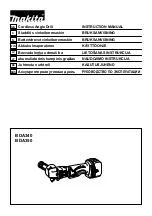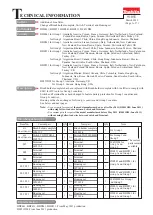
2-8
Precautions and Preparations for Use
PAD-L
2.5
Protective circuits
When selecting a regulated power supply, pay attention to important selection
standards that differ slightly from those for general instruments that handle electric
signals, in addition to the performance required of the power supply. Since a
regulated power supply handles power, an accident caused by equipment failure or
inadvertent operation will halt the entire system, and damage the power supplies and
load. In the worst case, this may lead to a fire.
Because power supplies are required for all electric circuits, electronic circuits, or
systems composed of such circuits, reliable operation is critical. The existence of
protective circuits that prevent accidents even in the event of a failure is crucial
selection standard.
Described below are protective circuits of the PAD-L series.
Overvoltage protection circuit
This feature can be set up from the front panel. It shuts off the POWER switch if the
output exceeds a set voltage. The action time is approximately 50 ms.
Voltage detection circuit
If the voltage of the smoothing electrolytic capacitor exceeds the rated voltage due to
negligent action such as failing to attach a shorting bar to the rear terminal board or a
rectifier circuit failure, this circuit trips instantly to shut off the POWER switch.
Current detection circuit
If the output current becomes excessive due to negligent action such as failing to
attach a shorting bar to the rear terminal board or a current limiting circuit failure, this
circuit cuts off the control transistor and shuts off the POWER switch or limits the
output current to approximately 120% of the rated current.
Temperature detection circuit
This circuit detects the temperature of the cooling package (heat sink) and shuts off the
POWER switch if the fins rise above 100 ˚C due to an increase in ambient temperature
or fan stoppage. For TYPE V models, this circuit also shuts off the POWER switch if
the core temperature of the main power transformer is 130 ˚C or more.
Inrush current prevention circuit (TYPE IV and TYPE V models only)
This circuit limits inrush current as follows when the POWER switch is turned on.
TYPE IV models 400 A (peak value) or less
TYPE V models 600 A (peak value) or less
Power fuse
Limits the input current.
This current-limiting fuse has been the type approved by Japanese Industrial
Standards (JIS) and complies with the Japanese Electrical Appliance and Material
Control Law. It uses a porcelain insulation tube and silicate arc-extinguishing sand
and does not produce a flame jet when the circuit is shut off.
Output fuse
Limits the output current.
This current-limiting fuse has been the type approved by JIS and complies with the
Japanese Electrical Appliance and Material Control Law. It uses a porcelain
insulation tube and silicate arc-extinguishing sand and does not produce a flame jet
when the circuit is shut off.
Summary of Contents for PAD-L III Series
Page 4: ...II PAD L...
Page 16: ...P 6 Preface PAD L...
Page 40: ...2 12 Precautions and Preparations for Use PAD L...
Page 86: ...4 34 Applied Operation PAD L...
Page 98: ...5 12 Names and Functions of Controls PAD L...
Page 130: ...7 14 Specifications PAD L...
















































